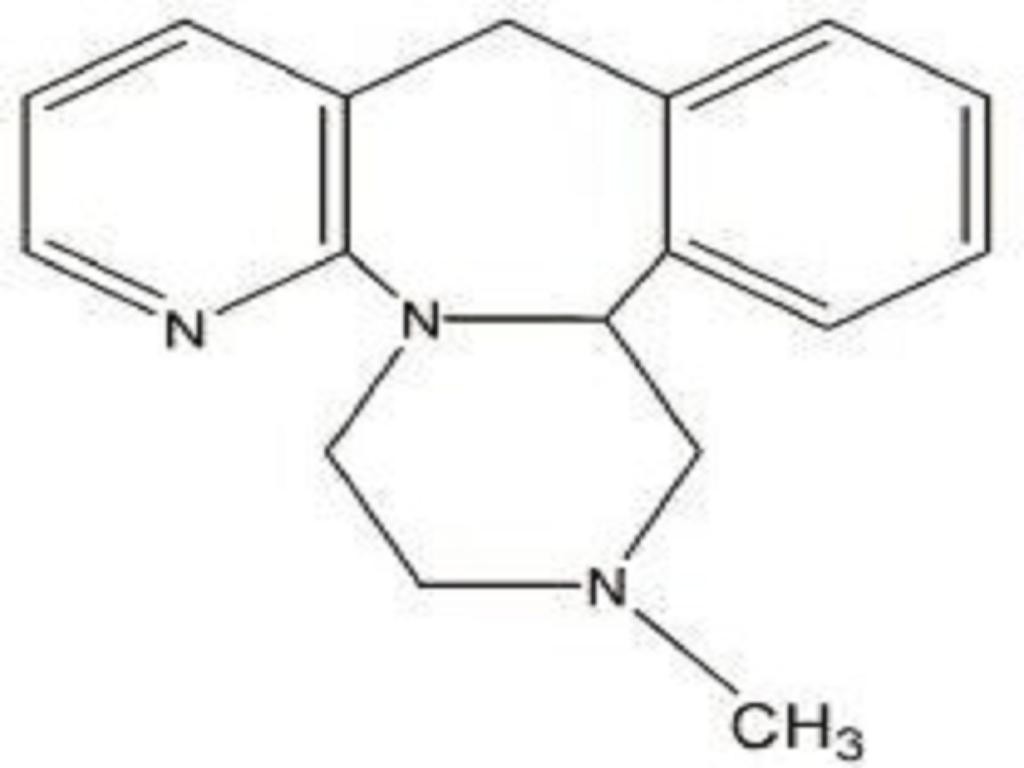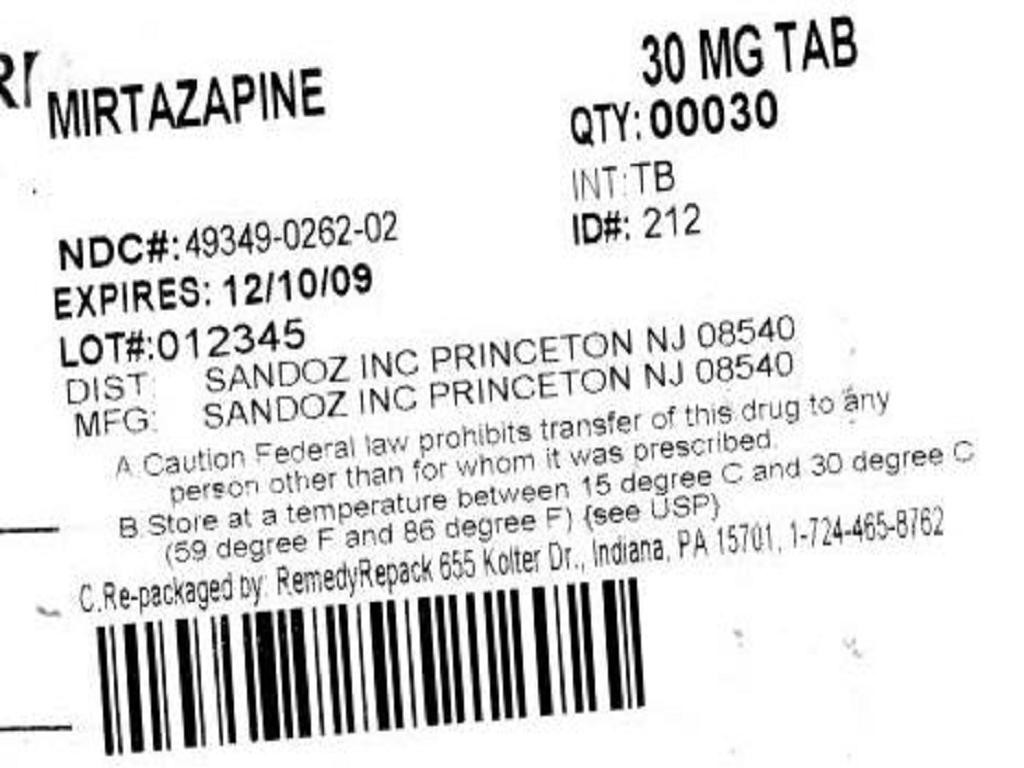Mirtazapine
FULL PRESCRIBING INFORMATION: CONTENTS*
- BOXED WARNING
- MIRTAZAPINE DESCRIPTION
- CLINICAL PHARMACOLOGY
- INDICATIONS & USAGE
- MIRTAZAPINE CONTRAINDICATIONS
- WARNINGS
- PRECAUTIONS
- INFORMATION FOR OWNERS/CAREGIVERS
- LABORATORY TESTS
- DRUG INTERACTIONS
- CARCINOGENESIS & MUTAGENESIS & IMPAIRMENT OF FERTILITY
- PREGNANCY
- NURSING MOTHERS
- PEDIATRIC USE
- GERIATRIC USE
- MIRTAZAPINE ADVERSE REACTIONS
- DRUG ABUSE AND DEPENDENCE
- OVERDOSAGE
- DOSAGE & ADMINISTRATION
- STORAGE AND HANDLING
- SPL MEDGUIDE
- INACTIVE INGREDIENT
- PACKAGE LABEL.PRINCIPAL DISPLAY PANEL SECTION
FULL PRESCRIBING INFORMATION
BOXED WARNING
Suicidality and Antidepressant DrugsWARNINGS: Clinical Worsening and Suicide RiskPRECAUTIONS: Information for PatientsPRECAUTIONS: Pediatric Use
MIRTAZAPINE DESCRIPTION

CLINICAL PHARMACOLOGY
PharmacodynamicsPharmacokinetics
Special Populations
Geriatric
PRECAUTIONSDOSAGE AND ADMINISTRATION
Pediatrics
PRECAUTIONS
Gender
Pharmacokinetics
Race
Renal Insufficiency
PRECAUTIONSDOSAGE AND ADMINISTRATION
Hepatic Insufficiency
PRECAUTIONSDOSAGE AND ADMINISTRATION
Clinical Trials Showing Effectiveness
INDICATIONS & USAGE
INDICATIONS AND USAGECLINICAL PHARMACOLOGY
CLINICAL PHARMACOLOGY
MIRTAZAPINE CONTRAINDICATIONS
CONTRAINDICATIONSWARNINGS
Clinical Worsening and Suicide RiskScreening Patients for Bipolar Disorder
Agranulocytosis
MAO Inhibitors
PRECAUTIONS
GeneralSomnolence
Information for Patients
Dizziness
Increased Appetite/Weight Gain
PRECAUTIONS: Pediatric Use
Cholesterol/Triglycerides
Transaminase Elevations
CLINICAL PHARMACOLOGYDOSAGE AND ADMINISTRATION
Activation of Mania/Hypomania
Seizure
Use in Patients with Concomitant Illness
CLINICAL PHARMACOLOGYDOSAGE AND ADMINISTRATION
INFORMATION FOR OWNERS/CAREGIVERS
Information for PatientsClinical Worsening and Suicide Risk
Agranulocytosis
Interference with Cognitive and Motor Performance
Completing Course of Therapy
Concomitant Medication
Alcohol
Pregnancy
Nursing
LABORATORY TESTS
Laboratory TestsDRUG INTERACTIONS
CLINICAL PHARMACOLOGYDrugs Affecting Hepatic Metabolism
Drugs that are Metabolized by and/or Inhibit Cytochrome P450 Enzymes
Alcohol
Diazepam
CARCINOGENESIS & MUTAGENESIS & IMPAIRMENT OF FERTILITY
CarcinogenesisMutagenesis
Impairment of Fertility
PREGNANCY
Teratogenic EffectsPregnancy Category C
NURSING MOTHERS
Nursing MothersPEDIATRIC USE
Pediatric UseBOX WARNINGWARNINGS: Clinical Worsening and Suicide Risk
PRECAUTIONS: Increased Appetite/Weight Gain
GERIATRIC USE
Geriatric UseCLINICAL PHARMACOLOGYDOSAGE AND ADMINISTRATION
MIRTAZAPINE ADVERSE REACTIONS
WARNINGSPRECAUTIONS
DRUG ABUSE AND DEPENDENCE
DRUG ABUSE AND DEPENDENCEControlled Substance Class
Physical and Psychological Dependence
OVERDOSAGE
OVERDOSAGEHuman Experience
Overdose Management
DOSAGE & ADMINISTRATION
Initial TreatmentElderly and Patients with Renal or Hepatic Impairment
PRECAUTIONSCLINICAL PHARMACOLOGY
Maintenance/Extended Treatment
CLINICAL PHARMACOLOGY
Switching Patients To or From a Monoamine Oxidase Inhibitor
Discontinuation of Mirtazapine Treatment
PRECAUTIONSADVERSE REACTIONS
STORAGE AND HANDLING
SPL MEDGUIDE
MEDICATION GUIDEMIRTAZAPINE TABLETS, USP
-
● all risks and benefits of treatment with antidepressant medicines
-
● all treatment choices for depression or other serious mental illness
-
● Pay close attention to any changes, especially sudden changes, in mood, behaviors, thoughts, or feelings. This is very important when an antidepressant medicine is started or when the dose is changed.
-
● Call the healthcare provider right away to report new or sudden changes in mood, behavior, thoughts, or feelings.
-
● Keep all follow-up visits with the healthcare provider as scheduled. Call the healthcare provider between visits as needed, especially if you have concerns about symptoms.
-
● thoughts about suicide or dying
-
● attempts to commit suicide
-
● new or worse depression
-
● new or worse anxiety
-
● feeling very agitated or restless
-
● panic attacks
-
● trouble sleeping (insomnia)
-
● new or worse irritability
-
● acting aggressive, being angry, or violent
-
● acting on dangerous impulses
-
● an extreme increase in activity and talking (mania)
-
● other unusual changes in behavior or mood
-
● Never stop an antidepressant medicine without first talking to a healthcare provider. Stopping an antidepressant medicine suddenly can cause other symptoms.
-
● Antidepressants are medicines used to treat depression and other illnesses. It is important to discuss all the risks of treating depression and also the risks of not treating it. Patients and their families or other caregivers should discuss all treatment choices with the healthcare provider, not just the use of antidepressants.
-
● Antidepressant medicines have other side effects. Talk to the healthcare provider about the side effects of the medicine prescribed for you or your family member.
-
● Antidepressant medicines can interact with other medicines. Know all of the medicines that you or your family member takes. Keep a list of all medicines to show the healthcare provider. Do not start new medicines without first checking with your healthcare provider.
-
● Not all antidepressant medicines prescribed for children are FDA approved for use in children. Talk to your child's healthcare provider for more information.
-
● are allergic to mirtazapine or any of the ingredients in mirtazapine tablets. See the end of the Medication Guide for a complete list of ingredients in mirtazapine tablets.
-
● currently take or have taken within the last 14 days, any medicine known as Monamine Oxidase inhibitors (MAOI). Taking an MAOI with certain other medicines, with similar actions to mirtazapine, can cause serious or even life threatening side effects.
-
● have or had liver problems
-
● have or had kidney problems
-
● have or had manic episodes
-
● have had a seizure (convulsion)
-
● have any heart problems
-
● tend to get dizzy or faint
-
● are pregnant or planning to become pregnant. It is not known if mirtazapine will harm your unborn baby.
-
● are breastfeeding. It is not known if mirtazapine passes into your milk or if it can harm your unborn baby.
-
● Take mirtazapine exactly as prescribed by your doctor.
-
● Take mirtazapine at the same time each day, preferably in the evening at bedtime.
-
● Swallow mirtazapine tablets as directed.
-
● It is common for antidepressant medicines such as mirtazapine to take up to a few weeks before you start to feel better. Do not stop taking mirtazapine if you do not feel results right away.
-
● Do not stop taking or change the dose of mirtazapine without talking to your doctor, even if you feel better.
-
● If you miss a dose of mirtazapine, do not take another dose to make up for the dose you forgot. Wait and take your tablet at the next regular time.
-
● If you take too much mirtazapine, call your doctor or poison control center or go to the emergency room right away.
-
● Mirtazapine can cause drowsiness, which may affect your ability to make decisions, think clearly or react quickly. You should not drive, operate heavy machinery or do other dangerous activities until you know how mirtazapine affects you.
-
● Avoid drinking alcohol or taking diazepam (a medicine used for anxiety, insomnia and seizures, for example) or similar medicines, while taking mirtazapine. If you are unsure about whether a certain medication can be taken together with mirtazapine, please discuss this with your doctor.
-
● See the beginning of this Medication Guide-Antidepressant Medicines, Depression and other Serious Mental Illnesses, and Suicidal Thoughts or Actions
-
● Serotonin Syndrome: This is a condition that can be life threatening. Call your doctor right away if you become severely ill and have some or all of these symptoms:
-
● stiffness
-
● muscle spasm
-
● confusion
-
● irritability
-
● agitation
-
● increased body temperature
-
● fast heart rate
-
● increased blood pressure
-
● Decreased White Blood Cells called neutrophils, which are needed to fight infections. Tell your doctor if you have any indication of infection such as fever, chills, sore throat, or mouth or nose sores, especially symptoms which are flu-like.
-
● Increased cholesterol and triglyceride levels in your blood
-
● Symptoms when stopping mirtazapine (discontinuation symptoms). Side effects may occur when stopping mirtazapine (discontinuation symptoms), especially when therapy is stopped suddenly. Your healthcare provider may want to decrease your dose slowly to help avoid side effects. Some of these side effects may include:
-
● dizziness
-
● abnormal dreams
-
● agitation
-
● anxiety
-
● fatigue
-
● confusion
-
● headache
-
● shaking
-
● tingling sensation
-
● nausea
-
● vomiting
-
● sweating
-
● Mania
-
● Seizures
-
● Low sodium levels in your blood: Call your doctor right away if you become severely ill and have some or all of these symptoms:
-
● headache
-
● feel weak
-
● confusion
-
● problems concentrating
-
● memory problems
-
● feel unsteady
-
● Store at 20to 25(68to 77[See USP Controlled Room Temperature.]
-
● Protect from light and moisture.
-
● Medicines are sometimes prescribed for purposes other than those listed in a Medication Guide.
-
● Do not use mirtazapine for a condition for which it was not prescribed. Do not give mirtazapine to other people, even if they have the same condition as you have. It may harm them.
-
● This Medication guide summarizes the most important information about mirtazapine. If you have any concerns or would like more information, talk with your doctor. You can ask your pharmacist or doctor for information about mirtazapine that is written for health professionals.
INACTIVE INGREDIENT
INACTIVE INGREDIENTS:ANHYDROUS LACTOSE
SILICON DIOXIDE
CROSCARMELLOSE SODIUM
FD&C BLUE NO. 2
FD&C YELLOW NO. 6
HYPROMELLOSES
MAGNESIUM STEARATE
CELLULOSE, MICROCRYSTALLINE
POLYDEXTROSE
POLYETHYLENE GLYCOL
STARCH, CORN
SODIUM LAURYL SULFATE
TITANIUM DIOXIDE
TRIACETIN
PACKAGE LABEL.PRINCIPAL DISPLAY PANEL SECTION


MirtazapineMirtazapine TABLET
| ||||||||||||||||||||||||||||||||||||||||||||||||||||||||||||||||||||||||||||||||||||||||||||||
PLEASE, BE CAREFUL!
Be sure to consult your doctor before taking any medication!